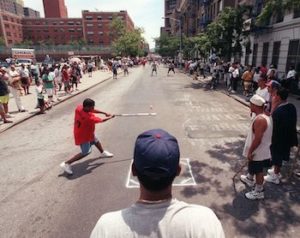
*Stickball's Black heritage and history are celebrated on this date in 1920. Stickball is a street game related to baseball, usually formed as a pick-up game, in large cities in the Northeastern United States (especially New York City and Jersey City).
The equipment comprises a broom handle and a rubber ball, typically a spalpeen, pensie pinkie, high bouncer, or tennis ball. The rules come from baseball and are modified to fit the space and situation, i.e., manhole covers for bases or buildings for foul lines. This game was widely popular among Black Irish, Italian, Jewish, and Puerto Rican youths growing up from the 1920s to the 1980s in Boston, Philadelphia, New York City, and Northern New Jersey.
There are different styles of Stickball based on how the ball is pitched. In Fastpitch, the batter has a wall or fence as a backstop. A rectangle is drawn on the artificial backstop to create a strike zone. The rectangle is chalked. If the batter does not swing and any part of the ball has chalk on it when it bounces back to the pitcher, the result is a strike. The result is a ball if there is no chalk on the ball. This type of play is seen in schoolyards throughout Staten Island, NY, and, to a lesser extent, Queens, NY, and Jersey City, NJ. The pitcher stands 40 to 50 feet from the batter in a slow pitch, and the ball is hit after one bounce.
This Stickball often attracted Black players from the Negro Leagues and major league baseball teams in the Northeast. On off days, Jackie Robinson (Brooklyn Dodgers), Willie Mays (New York Giants), and others would show up in the neighborhood and play.

In fungo, the batter tosses the ball into the air and hits it on the way down or after one or more bounces. The batter may be out after one, two, or three strikes depending on community rules. If the ball lands on a roof or porch or breaks a window far away, it is usually ruled a home run. Hits are decided by how far the ball travels. In some versions of Stickball, there is no running. However, in most leagues, including the New York Emperors Stickball League, the batter must run the bases like in baseball.
In Boston variations of Stickball, a broomstick is usually replaced with a cut hockey stick, allowing a little more 'pop' on the ball if hit correctly. Also, the ball does not necessarily bounce while pitched when playing on a slow pitch. A 'loaded Wiffle bat,' consisting of a Wiffle bat sawed off and filled with wet newspaper or superballs then wrapped in electrical, duct, or hockey tape to hold it together, is also popular in the North Shore suburbs.
Regarding base runners, 'Monkey Ball' is also usually allowed in slow pitch. When 'monkey ball' is allowed, fielders can throw the ball at baserunners, eliminating the need to tag a base to get a runner out. Another rule that can be played while running the bases is "pitcher poison." This allows fielders to throw the ball to the pitcher standing on the mound instead of a first baseman. In another completely unrelated game by the same name, players stand in a circle, all holding sticks, usually broom handles. They then pass a giant tennis ball to each other by rolling it along with the stick and launching it.
The objective of the game is to keep the ball flowing. Each player is unique in their technique. Unlike the other baseball-related games, this game is more akin to hackey sack and contact juggling. 'The game involves smoothly moving the ball from one person to another using the ball and the stick. It's cooperative rather than competitive and is beautiful to watch, something like Tai Chi.'
The major difference between Australian Stickball and most games is the lack of competitive nature and increased cooperation. It first appeared in Australia in the late 1990s and played in the U.K., Europe, and India. Stickball has recently experienced a revival in Northern New Jersey, with Bergen County-based musicians Danny Britt and Jay "Gazoo" Allen creating a new co-ed league.